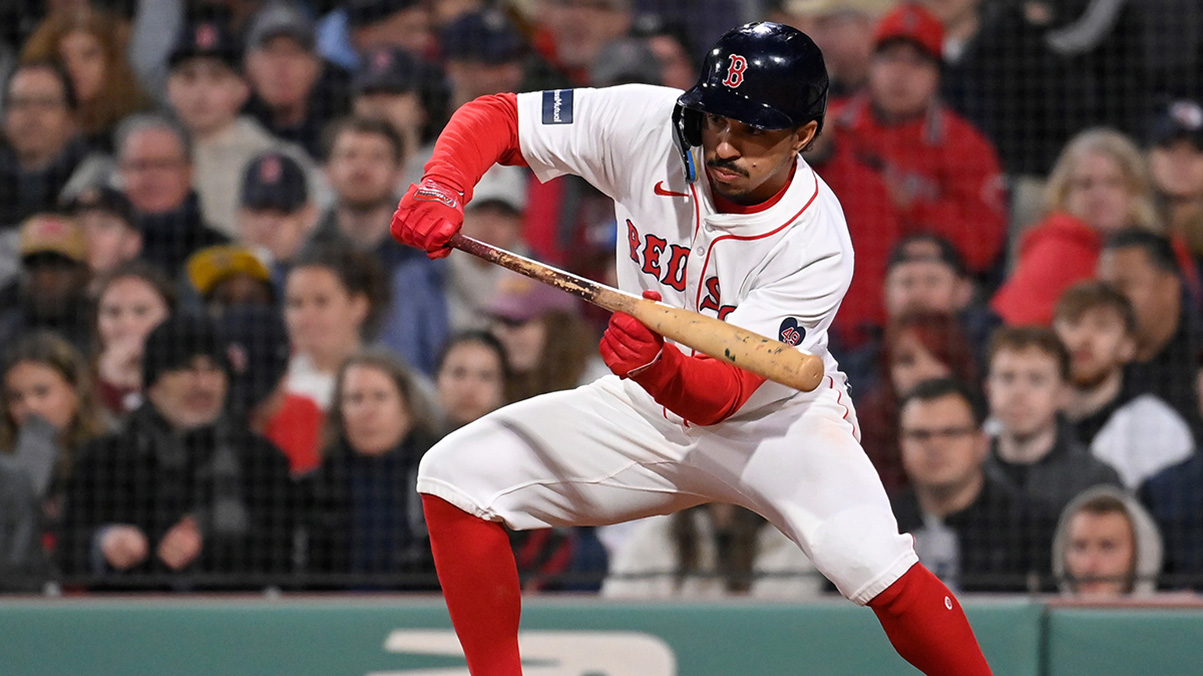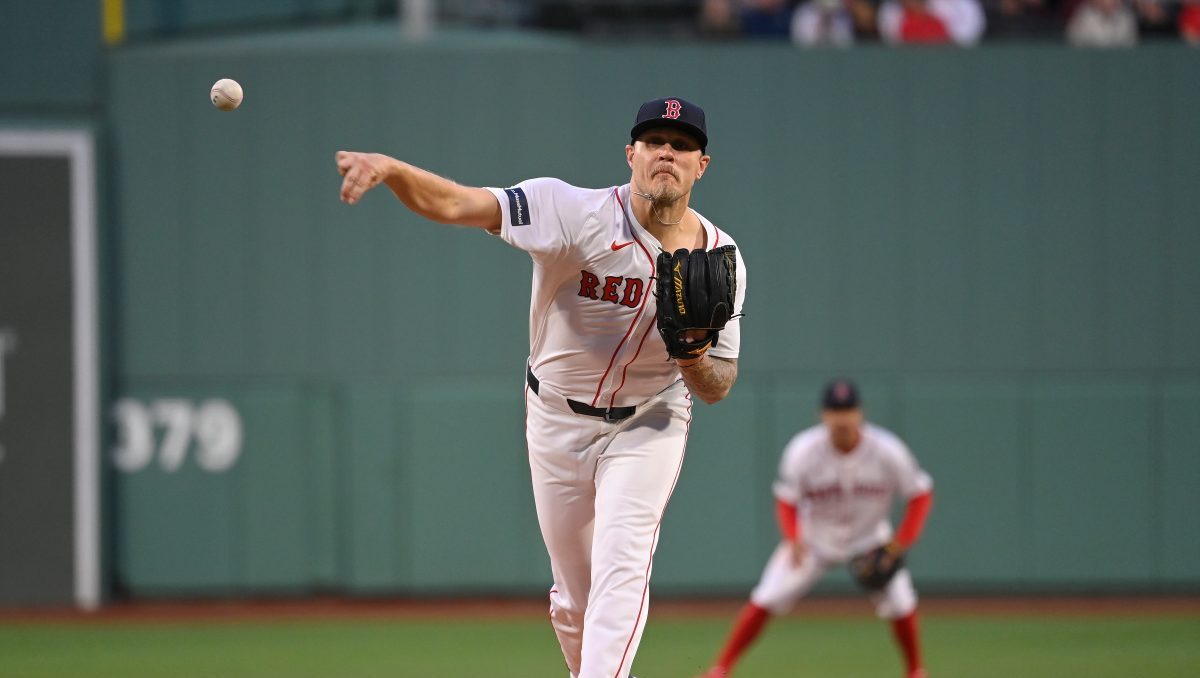Like his motion, the making of a Chris Sale start is unorthodox genius.
The ace's routine was formed in Chicago, where the Red Sox open a three-game series against the White Sox today. His plan for the usual four days between outings underscores how blessed he is, and how well the 28-year-old knows what his body needs to maintain three dominant pitches thrown at a hummingbird's pace.
MORE ON CHRIS SALE
- Pedro Martinez sees himself when he watches Sale pitch
- WATCH: Lou Merloni thinks Sale is more of a must-see athlete than Tom Brady
When Sale takes the mound Tuesday against his old team, he'll have 73 innings pitched and 101 strikeouts. Those are American League-best numbers entering the week.
Even Sale, no stranger to excellence, indicated some surprise at how well his Red Sox career has begun. His ERA is 2.34.
"Would I say I'm surprised? Yeah," Sale said recently. "But at the same time, I wouldn't say I am. I'm having fun, I know that. You know, it's a very result-oriented game. But results can be very skewed. Because two guys can work the same, do the same things on the same day at the same time, and get two totally different results in this game.
Boston Red Sox
"So while people like to look at the results, sometimes they can be skewed . . . I look more in my preparation than I do in the results."
Sale explained to CSNNE just how that preparation works: from his choice to eschew scouting reports, to how he has recently embraced a Randy Johnson-influenced workout routine the Red Sox use across their entire system, something called Nine Innings.
"He's such a beast," assistant strength and conditioning coach Mike Roose said. "He's in phenomenal shape. We can push him harder than maybe some other guys . . . His body's able to work at such a high level."
* * * * *
Before every Red Sox game, there's a meeting to discuss the starting pitcher's plan. The catcher attends, along with pitching coach Carl Willis and bullpen coach Dana LeVangie.
The huddles are usually quick; maybe three minutes, backstop Sandy Leon said. Of course, the pitcher typically attends as well.
Sale never does.
"We don't talk that much," Leon said of Sale.
There's an outstanding work ethic behind every start made by Fenway's greatest spectacle since Pedro Martinez. A planning meeting just isn't part of it.
"My preparation is more physical than it is mental, I guess," Sale said.
The new Red Sox ace doesn't really use video. He doesn't look at scouting reports.
Sale, then, is a throwback beyond his get-it-and-throw-it pace. He actively avoids tools that other pitchers desperately need and seek in the age of analytics.
He wants a Buddhist-like temperament on the mound, a quiet mind.
Still, it's one thing to never shake your catcher, and another to separate yourself from his thought process. That's near lunacy, unless your stuff is just that damn good.
"I guess you could look at it like that," Sale said. "I look at it for me as just clearing my mind. When I'm out there, I'm not worried about what this guy's hitting over the last X amount of at-bats. Because if I read on a scouting report that he's hitting .450 on fastballs in, I'm still going to throw a fastball in. And if I know that going in, I could be timid throwing that.
"You don't ever want to throw a pitch in the big leagues, hoping, praying, defensively. That takes all that away from me."
Sale's greatest effort in between starts, then, is to keep his stuff this devastating, to keep his lithe machine in tune, so that his mind may remain free.
"Let's face it, any athlete -- I'm probably cliche here -- but when you're just in the present, in the moment, you're going to function at your absolute best," manager John Farrell said. "And with a guy that talented, who's got that much self-confidence to go along with tremendous physical ability, he's in that place a lot."
* * * * *
"He's got a lot of really good physical qualities already," Roose said. "He's very flexible. Naturally, just by his genetics. His endurance is extremely high. He works on that [doing cardio]. You can tell. We knew right from the first week of spring training [that] endurance is something he works on.
"He has the three really important things you'd need to pitch 35 starts in the season."
That includes what Roose described as sneaky strength. Sale looks like he could use an extra burger or two, but he's better than his rotation mates at more than just pitching.
"He might squat more than all our starters, believe it or not," Roose said. "I was surprised. He surprises me sometimes."
Day 1 after Sale pitches is a recovery day. He likes to go for a run, and if the Sox are home, he'll try to do Pilates. A light workout is possible, too.
On Day 2 comes heavy lifting (as well as a shoulder program that customarily follows workouts).
"I'm not a big muscular guy," Sale said. "I'm just trying to stay long and loose as more the key to my success.
"I don't need to like do power lifting or anything like that. I mean I do squats, we do dead lifts . . . A lot of pulling. I don't do a whole lot of pushing, puts pressure on the front of my arm."
On Day 3, Sale throws his side sessions, goes through a shoulder program, and then works out.
But that workout has changed recently, to Nine Innings.
"You do three workouts, three sets of three workouts," Sale said. "Kind of equals nine innings. Raises your heart rate a little bit, gets some bloodflow."
* * * * *
Sixteen years after Johnson and Curt Schilling carried the Diamondbacks to a World Series championship, Sale has a slice of that duo's old workout plan.
Nine Innings is a pitcher's exercise circuit focusing on power and cardio work, and it's been in place with the Red Sox since Roose joined the organization in 2009.
The circuit dates back to Dave Page, the Sox' former strength coach who held that job for the 2001 Diamondbacks -- with Schilling and Johnson.
Like Schilling, Page wound up in Boston. The latter was let go after the September 2011 collapse, and Roose has overseen the program's evolution since. It exists now at every level of the Sox organization.
"Schilling was there, and then when Schilling came here, it kind of continued," Roose said of the origin story. "Now it's evolved way differently than what it was back then."
Nine Innings is tailored to each pitcher's needs before each outing, based on how they're feeling. Typically, sessions are 10-15 minutes.
"It's a series of power-based movements: plyometrics, medicine-ball throws, in kind of like a circuit fashion," Roose said. "We're also trying to get their cardiovascular system up . . . The third day is really about getting the fast-twitch muscle fibers, almost priming their neurological system to be able to repeat that intense throw."
When Sale joined the Sox, all coaches were simply learning what he likes to do. Like pitching coaches, strength coaches didn't dare tinker. Trust needs to be built.
At season's start, Sale decided he wanted to see what Nine Innings was about.
"He was just kind of like, ‘Hey, I want to try it out,'" Roose said.
The early review is great. Why? The sweat, in part.
"I love it," Sale said. "It's actually one of my more favorite days because I mean, let's be honest, you feel you get more out of it.
"It's been run on the treadmill, and then we're going to do a push-up. And then we're going to do a [medicine-ball] slam, and then we're going to do a TRX pull. Treadmill, go through that again, treadmill, go through that again, and then switch it up again."
Day 4, the final day before a start, is variable and typically very light. Sale always stretches -- hamstrings, lower body, arms -- and he might do Pilates.
He's a rubber-band man.
"I'll do push ups with a band over my shoulder, something like that for a little bit more resistance," Sale said generally. "I don't do like bench press or anything like that, and if I do, it's really low weight. Just trying to get reps, just get kind of blood flow in there.
"For me, it's just trying to stay loose and get that elasticity back and being able to get extension and really being able to get that whip back."
* * * * *
Someday, Sale won't have the benefit of youth, of the nastiest stuff, on his side.
Willis has seen a guy like this before in a previous gig, a guy who doesn't go to the little pregame pow-wows.
"Felix Hernandez when I was in Seattle," Willis said. "He didn't even care to know the lineup."
They call Hernandez "King." But Hernandez is at the stage of his career where his stuff is diminished.
"Maybe it's a little different now that his stuff's not the same," Willis said of Hernandez. "He's got more innings, he's got a little older. But I think it's that supreme confidence and a mix of pitches and action of pitches that you just have total confidence in: 'Whatever I choose to throw, I'm going to beat you with it.' "
Sale thinks that way. With the way he works, it could be a long time before he need think differently.



